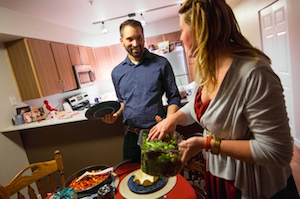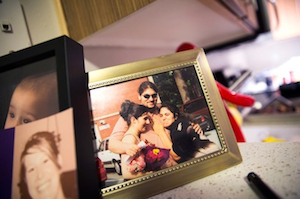SEATTLE — Carlos Romero’s apartment is marked with remnants from his former life: a giant television from his days playing World of Warcraft and a pair of jeans the width of an easy chair. The remnants of that time—when he weighed 437 pounds—mark his body too: loose, hanging skin and stretch marks.
“I lift weights and work out and work hard, but there’s lasting damage,” said Romero.
Yet for all the troubles he had dating when he was obese—all those unanswered requests on dating web sites—shedding weight left him uneasy about how much to reveal. “If you were to say to someone on the first date, ‘I lost 220 pounds,’ you’re indicating that you had a very serious issue at one point and that you may still have that issue,” he said. “So it’s not something I put on a dating profile because I don’t want people to judge me for it.”
Indeed, the stigma of obesity is so strong that it can remain even after the weight is lost. Holly Fee, a sociologist at Bowling Green State University, has conducted some of the only research on dating attitudes toward the formerly obese. In 2012, Fee published her findings in the journal Sociological Inquiry.
She found that potential suitors said they would hesitate to form a romantic relationship with someone who used to be heavy. “The big dragging factor in why they had this hesitation in forming this romantic relationship was that they believed these formerly obese individuals would regain their weight,” Fee said.
The prevailing belief is that people who have never been obese can control their weight, and those who’ve been heavy have less will power, said David Sarwer, a psychology professor and the director of clinical services at the Center for Weight and Eating Disorders at the Perelman School Medicine at the University of Pennsylvania. He said the physicians and the general public tend to think that obesity is “a moral failing, and that they can’t push away from the table.”
For men and women who have lost a significant amount of weight, fears about excess, hanging skin can hold them back from dating and being intimate. Health insurance almost never pays for costly plastic surgery to correct the problem which can be uncomfortable and embarrassing.
“I think they can be particularly self-conscious about this issue and be worried about the first time the partner sees them undressed,” Sarwer said. “How are they going to respond? Are they going to be grossed out? Are they not going to want to have sexual intimacy with them a second time?”
But it wasn’t sex or romance that sparked the big change in Carlos Romero two years ago. That’s when, at age 28, he was diagnosed with muscular dystrophy. Romero knew if he didn’t lose weight, his condition could worsen quickly. He stopped eating pizza, Ramen noodles and Dr. Pepper and began exercising. Then, a year ago, after he dropped a number of jean sizes, he tried Internet dating again. Romero updated his old profiles and pictures and started sending out messages.
“It was amazing at the time,” he said. “The girls that I was like, ‘I’ll never hear back from this girl. And then I’d hear back from them, and I was like, ‘Holy crap! This is so different.’ It felt like a whole other world had opened up.”
Now, Romero spends many nights on dates with his new girlfriend, Kate Rowe. They met on OkCupid.com after he sent her a message. “I saw, ‘Carlos a new message,’” Rowe recalled. “And he’s into climbing and I read his profile and I was like, ‘Why not? I have nothing to lose.’” It didn’t hurt that he looked “smoldering and broody” in his picture, she says.
Their third date happened to be Romero’s 30th birthday party, and he decided to tell Rowe about his massive weight loss, which he thought could be “a potential deal breaker.” “I don’t want to like this girl any more than I already do without having her know,” he remembers thinking. “I said, ‘I have to tell you this thing. Please don’t judge me.’”
Romero knew the risk he was taking. He thought, “What if she doesn’t want to be anywhere near me?” Instead of being repulsed, though, Rowe said she was inspired by his hard work and commitment to good health.
If she had seen Romero’s old profile, back when he was bigger, she probably would not have responded, she says. But now, he was in to rock climbing and being active, and they have things in common.
For Carlos, there are still physical and psychological hurdles to being in love. It’s difficult for him to be intimate. He says shyly, “She’s seen everything.” And when he looks in the mirror, he still sees a 400 pound man. His mind hasn’t quite caught up to his body.
This story is drawn from reporter Sarah Varney’s new book “XL Love: How Obesity is Complicating America’s Love Life.









